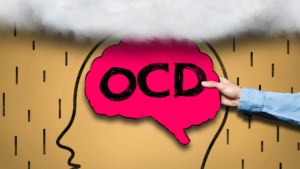
Obsessive-Compulsive Disorder (OCD) is a mental disorder that affects millions of people worldwide. It’s often referred to as the “stupid disease,” because people with OCD can find it difficult to explain what’s wrong with them. But don’t let that scare you – OCD can be treated effectively with medication and therapy.
In this blog post, you’ll learn everything you need to know about the obsessive-compulsive disorder: what it is, how to treat it, and the symptoms to watch out for.
What is Obsessive Compulsive Disorder?
Obsessive-compulsive disorder is a mental disorder that affects how a person thinks, feels, and behaves. People with OCD may have persistent and intrusive thoughts (obsessions) that cause them significant anxiety. These thoughts may be about dangerous or disgusting things, or about very specific, often trivial details in one’s life. The fear of having these thoughts or performing the rituals can be so overwhelming that people with OCD often find it difficult to function normally.
Symptoms of OCD
Obsessive-Compulsive Disorder is a mental disorder characterized by intrusive and repetitive thoughts, images, or behavior that cause significant distress or impairment. It can be debilitating and can often be treated with therapy and medication.
The most common symptoms of OCD are severe anxiety and obsessions, which are thoughts or images that the person cannot get rid of. These thoughts may concern specific objects, situations, or rituals. The person may feel compelled to perform certain rituals in order to ease their anxiety or stop the obsessions from occurring. Other common symptoms of this disorder include repeated checking of locks, counting, hand wringing, and other repetitive behaviors. People with OCD often feel great stress when these rituals are not performed properly or when they are interrupted.
Obsessive-compulsive disorder can have complex causes, but there is some evidence linking OCD to potential nutritional deficiencies. For example, some research suggests OCD may be associated with inadequate levels of vitamin D, zinc, iron, and magnesium. Assessing your nutritional status can be an important step. Getting baseline testing of your micronutrient levels through bloodwork or undergoing methylation genetic testing can help identify any deficiencies or imbalances that may contribute to OCD symptoms. Of course, nutrient testing and genetic screening should be discussed as part of a comprehensive wellness plan overseen by your healthcare provider. Identifying and addressing any underlying deficiencies through diet, lifestyle, and possibly supplements may help mitigate OCD. Discuss these options with your doctor to determine if nutritional deficiency could be a contributing factor in your OCD.
OCD can interfere with normal life functions and relationships. It is important to seek professional help if you are experiencing any of the signs and symptoms of obsessive-compulsive disorder.
How OCD is Diagnosed
OCD is a mental disorder that is characterized by obsessions and compulsions. To be diagnosed with OCD, a person must have at least one obsession and at least one compulsion. Some common obsessions include fearing that something bad will happen, having repetitive thoughts or images, or feeling like something is chasing them. Compulsions can involve washing your hands excessively, checking to see if the door is locked, or counting certain numbers. If you think you may have obsessive-compulsive disorder, it’s important to talk to your doctor. They can help rule out other possible causes of your symptoms and give you the best possible treatment plan.
How to Treat Obsessive-Compulsive Disorder
People with OCD often feel like their thoughts or behaviors are always important, but they can’t control them. There is no one-size-fits-all approach to treating it, but there are many things you can do to help improve your symptoms. Here are a few tips:
Talk About Your Symptoms With Someone You Trust
Talking about your thoughts and feelings with someone you trust can be very helpful in managing OCD. This person can provide support and guidance as you work to manage your symptoms.
Avoid Triggers And Overspending
Avoiding triggers and overextending yourself can also help reduce the frequency of OCD symptoms. Try not to worry excessively about things that don’t matter and avoid situations where you might feel overwhelmed or anxious.
Go for Medications and Alternative Treatments
If prescribed medication is effective for managing your symptoms, take it as prescribed by your doctor. Many people find that medications such as SSRIs (selective serotonin reuptake inhibitors) or TCAs (tricyclic antidepressants) are very helpful in reducing the severity and frequency of their OCD symptoms. In addition to medication, some individuals have explored alternative treatments such as Exposure and Response Prevention (ERP), or Transcranial Magnetic Stimulation (TMS) provided by healthcare providers like telapsychiatry, which has shown promise in alleviating OCD symptoms when recommended by a medical professional.
Seek Social Support
Social support can be very helpful in managing OCD. Find people who you can talk to about your thoughts and feelings and who will support you through your struggles. There are also support groups available for people with OCD. Whether you’re currently living with it or want to learn more about it, there’s plenty of information available online.
Additionally, consider visiting an OCD clinic in brisbane or in your local area to receive professional therapeutic support. These clinics could offer specialized resources and guidance tailored to your needs, including options like Cognitive Behavioral Therapy and other therapeutic approaches. Seeking help from trained professionals is particularly important if you find your symptoms overwhelming, as it could complement the social support you receive and provide you with valuable tools to navigate your challenges more effectively.
Ultimately, obsessive-compulsive disorder can be a difficult condition to live with, but with the help of professionals and friends, it can be manageable. In this article, we aim to provide you with all the information you need to start your journey toward recovery from it. We hope that by reading this guide, you will feel more equipped to deal with OCD symptoms and eventually lead a fulfilling life free from obsessive thoughts.



